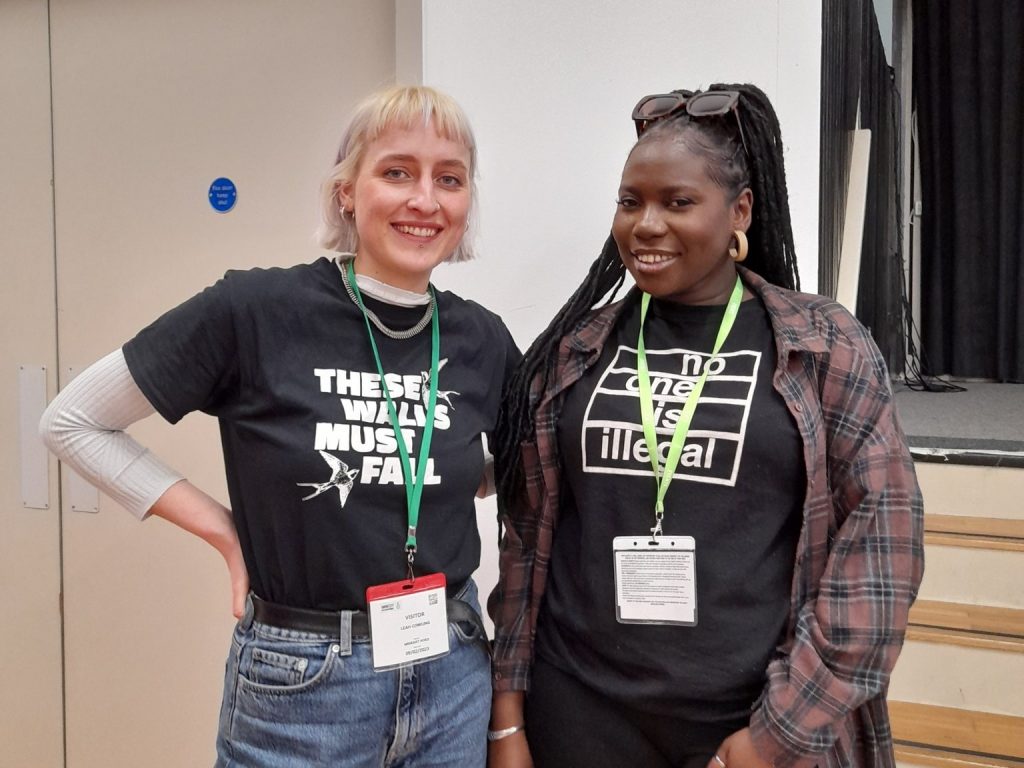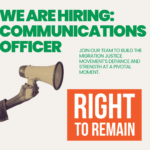
On the 9th February, staff members from Right to Remain attended ‘A better deal for migrants: Campaigning for a fairer visa and settlement process’, an event facilitated by Migrant Voice. The event brought together individuals, campaigners, and organisations united in opposition to the UK’s unjust visa settlement process. The discussions were led by individuals who have experienced first-hand the harshness of the settlement process – particularly the 10 year route, which requires applicants to renew their visa every 2.5 years at huge expense. This is a ridiculously onerous process, which causes immeasurable harm.
The event was perfect for Right to Remain: we are in the process of strengthening the immigration sections of our Toolkit to cover legal issues which are not covered by publicly funded legal advice. Our top priority is ensuring that as many people as possible without legal advice can secure their right to remain.
It was a comforting return-to-reality experience to share physical space with fellow campaigners in the sector. People who had only ever met on pixelated Zoom screens exclaimed how nice it was to finally meet each other in person!
We were very excited to see Fatou, from the Greater Manchester Immigration Aid Unit, wearing a Right to Remain ‘No One is Illegal’ T-shirt. We recently read about GMIAU’s incredible campaigning work on the 10-year route. Read more about this here.
UK: the most hostile visa settlement process in the world?
The event started with a panel discussion with Wilfred Sullivan (Organiser at the TUC), Bell Ribeiro-Addy (Labour MP for Streatham), Keziah Gitonga (Visa Fees Campaigner), Madeline Sumpton (Director of Migration Observatory) and Nazek Ramadan (Director of Migrant Voice).
We learnt that the UK has some of the highest visa fees in the world. No single European country has such expensive routes to settlement. As well as the costs of the visa renewal, there are also ‘hidden costs’: such as the life in the UK test; the Biometric Residence appointment; and the NHS surcharge – effectively a form of double taxation on migrants.
The UK is also uniquely hostile in its reliance on temporary ‘probationary’ forms of leave to remain which require regular renewal. Even the US, a country which is not renowned for its progressive immigration law, gives spouses of American citizens permanent ‘Green’ cards after one successful application.
Panelists also spoke about the Home Office culture of punishing simple mistakes. In other countries, a missing supporting document might lead to a phone call to request the document. In comparison, in the UK, it is almost impossible to contact the Home Office directly about your application. A mistake will lead to the application being rejected, without the opportunity to amend the mistake and without a refund. This is just one cause of anxiety experienced by so many people on this route to settlement.
We also learnt that the Home Office is making 800% profit on these types of applications; money which it is using to finance the expansion of the detention estate, and an increasingly privatised immigration and asylum system.
Impact on families
The first (real life!) breakout session we attended was on the impact of the visa settlement process on families. It was led by Reunite Divided Families, Praxis and JCWI. Families with children are particularly harshly affected by the extortionate fees: a family of 4 can expect to pay £50,000 before they can settle in the UK. This forces many families to live in overcrowded accommodation to save money, and many are forced into debt. With the current cost of living crisis, these high fees are pushing many to breaking-point.
We heard stories of the hugely detrimental effects the visa settlement process has on mental health. A campaigner explained how she put all her energy into shielding her children from the true struggles of the process: ‘we must be strong for them’. The harm of this process is acutely felt by parents and children, particularly by single parents and those in precarious, low-paid work.
Impact on work
After a bustling networking lunch, we returned to breakout groups for a session on the impact of the visa settlement process on work, led by Ramfel (Refugee and Migrant Forum of Essex and London). This session focussed on the damaging effects of ‘Section 3C Leave’. This form of leave is designed to automatically extend rights from an expired visa while waiting for new physical visa documents. The problem is that because of extensive Home Office delays, many people on Section 3C Leave are left without any documents to prove their status. This is particularly problematic due to the hostile environment, which is characterised by invasive immigration checks on all areas of life: from employment, housing to healthcare.
An individual shared that they had lost their job as a result of not having documents to prove their status, despite having applied for a visa renewal in time. This had hugely detrimental consequences for this individual and their family. Not only do individuals loose their jobs, but employers who do not understand Section 3C leave are unlikely to offer employment to people in this situation. As a result, more and more people are discriminated against, and unjustly excluded from the labour market.
These problems are felt most acutely by those in low-paid jobs, where there is high staff turnover and poor protection of rights. These problems also disproportionately affect working class and Black communities. Looking to the future, the Home Office is set to fully digitalise its systems. This is likely to increase the problems felt by those applying on the long routes to settlement.
Creative campaigning: looking to the future
After a session on the importance of rest in campaigning, the event finished with a session on creative campaigning strategies. We brainstormed ideas for campaigns against the visa settlement process, such as advertising stunts on bus stops, videos and public actions. This event was a great opportunity to build networks with organisations working towards a shared goal. There was general agreement the sector needs to expand its focus beyond London, to all areas of the UK. A particularly salient point raised in this section was that campaigning was a lifelong commitment. We are in this together, for the long haul. The UK’s racist, profit-driven, and colonial immigration state must be dismantled, and we will only achieve this together.
Routes to settlement have become longer, more complicated, and more expensive. More and more people are on the long routes to settlement. We know there is a lack of immigration lawyers, and a lack of free legal information available on these types of applications. And we also know that more people need information on how to navigate these systems. This is why Right to Remain are expanding the non-asylum sections of our Toolkit. We are committed to ensuring that our resources are informed by, and tailored to answering questions of those at the sharp end of the immigration system.
If you want to work with us in this area, please get in touch with us – our staff members are in London, Birmingham, Manchester, Halifax and Glasgow. We look forward to hearing from you!
















Discussion: